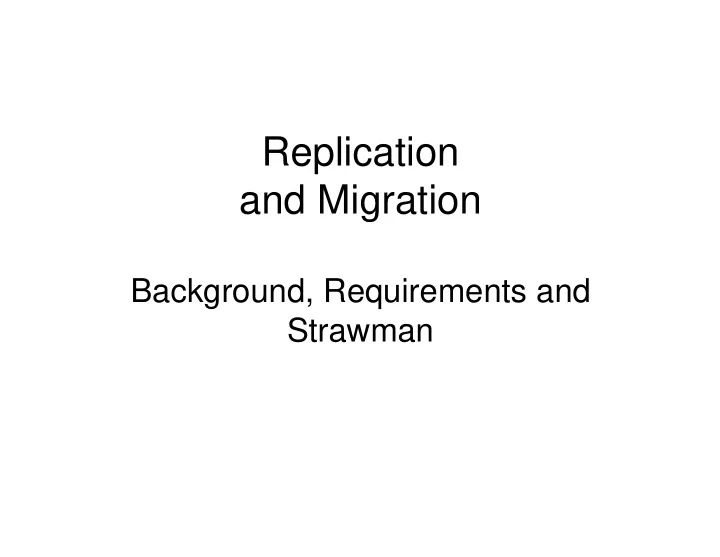

Replication and Migration Background, Requirements and Strawman
Migration and Replication • The point is: Increased availability – Through replication of shared read-only data – Less “NFS Server not responding” • The point is: Increased transparency – Through transparent migration – Eliminate client reboots to bind to new location
Replication and Migration • Replication is the creation of one or more copies of a “file system” – Distinguish “read-only” from single writable master and “read-write” replication • Migration is the movement of a “file system” from one server to another – Useful only when transparent – Necessary even when not – Rubber meets the sky on migrating single writable file system
NFS V4 Migration/Replication • NFS Version 4 defines client to server interaction ONLY – List of servers hint to client where file system may migrate/replicate to – The volatile file handles allow cheesy solutions � – Hashed file names persist �
Quick Review • Sun client failover for NFS Version 3 (and 2) – Store pathnames in rnodes – Failover transparent with re-resoolve using alternates from Automounter maps – No migration support? – What replica consistency? � • Solves the problem of hung client when “replicate” read-only binaries etc are available
Quick Review • AFS and DFS replication – Single master write copy for replication, read-only replicas – Client failover through “file system” resolution using replicated data base – “Inodes” preserved (file system semantic) • Migration leverages infrastructure – Move a home directory (writable file system)
Quick Review • rdist • rsync
Requirements
Requirements • Transparent client failover – For read-only replicas and migrated writable volumes • Performance – Bandwidth conservative – Differences propagated – Restartable – Client lockout time minimized • Security – As good as V4
Requirements • Scalable – Huge file systems – Small file systems • Capability negotiation between “peers”(?) – I believe this referred to things like attribute differences • Efficient multi-way replication (propagation)
Requirements • Correctness – “Atomic” propagation of file system from client view – Failover to a correct replica version • TCP/IP based – No legacy UDP requirement
Issues
Issues • Replica versioning non-existent – Failing over to “correct” version of replica impossible? – Base V4 protocol change? – Proposal: Investigate versioning requirement
Issues • Single vs. multi-master – Multi-master entails conflict resolution – Proposal: Single master copy sufficient – objections? • Disconnected operation irrelevant – Corollary to above – Proposal: Disconnected operation for clients not required – objections?
Issues • File oriented – Fits with NFS model, and heterogeneous – Efficiency concerns – Block-oriented not heterogeneous – Proposal: Draft proposal for comments. • Replicating “opaque” (to NFS) local file system attributes – Proposal: NFS Version 4 named attributes propagated – unsupported attributes not
Issues • Migration/replication only for V4 – Not a general (rdist) mechanism • Lock and delegation propagation – Certainly a requirement, but ouch! – Proposal: Locking and delegation state propagated, acceptable that it resembles a server reboot. – (Brent?)
Issues • We pushed need for reliable name/location service from clients to servers – Proposal: Investigate how far to tie back end protocol to name sevice.
RFC: NFS V4 “file system” • Has a file system ID • A closed set of unique “file ids” – aka inodes � • A set of attributes associated with the “file system” • The basis for replication and migration?
File system model issues? • fsid should define a “file system” – Hard links exist within the file system and must be maintained • Attributes of file must be maintained – Times cannot be screwed up • Heterogeneous interoperability – What happens if you migrate a file system from multibyte to single byte name encoding environment?
The process • Recommendation is to re-charter the existing workgroup to specify back-end protocol – Need to write new charter
? ? ? ? ? ? ? ? ? ? ? ?
Migration in DFS: an example • A read-only clone is made of a “fileset” (replication unit) – Brief operation, copy-on-write properties for primary • Clone is transferred – During transfer clients have read/write access to primary fileset • The clients are locked against further updates during incremental transfer of new data • The clients atomically fail over to the new location
Migration in DFS: an example • Migrated volume only visible on successful transfer • Client disruption is minimized • Performance in the face of large files (by doing block incremental completion phase) is solved
Replication: DFS example • Replication based on clone operation – as in migration (and backup) • Replicas are versioned • Transaction to enable replica on successful transfer • Coda extends to writable replicas?
Replication: rsync example • Super-rdist protocol with recovery • Over TCP • Propagates block level updates • Works on standard file systems • Could be basis for NFS Version 4 replication • Seems to lack “atomic” update from client perspective and versioning (to deal with failure recovery)
Recommend
More recommend